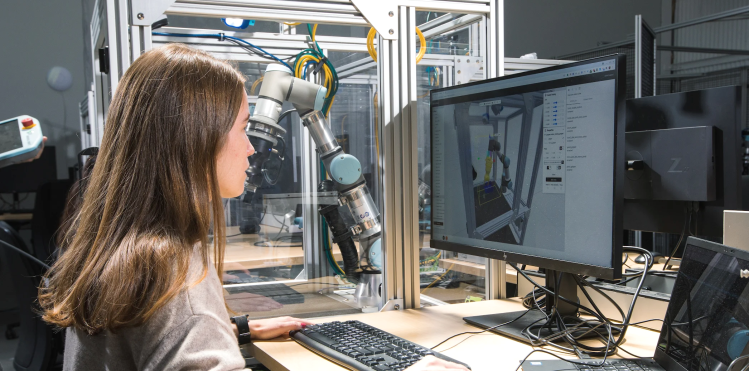Want smarter insights in your inbox? Sign up for our weekly newsletters to get only what matters to enterprise AI, data, and security leaders. Subscribe Now
Google parent Alphabet has spun out a new industrial robotics company called Intrinsic.
Led by Wendy Tan-White, a veteran entrepreneur and investor who has served as VP of “moonshots” at Alphabet’s R&D business X since 2019, Intrinsic is setting out to “unlock the creative and economic potential” of the $42 billion industrial robotics market. The company said it’s creating “software tools” to make industrial robots more affordable and easier to use, extending their utility beyond big businesses and to more people — 70% of the world’s manufacturing currently takes place in just 10 countries.
Surge
Industrial robots have surged in demand over the past year in the wake of the pandemic — in Q1 this year, the Association for Advancing Automation reported a 19.6% increase in orders across North America alone. While such robots have historically been concentrated in the automobile industry, they have segued into many facets of the economy, from ecommerce warehouses to medical equipment assembly.
Developing dexterous, performative robotic arms is only part of the battle in terms of automating traditional manufacturing tasks. The process of “teaching” robots how to carry out a relatively simple task can be a resource-intensive endeavor requiring specialist expertise, and this is the part Intrinsic is working on.
AI Scaling Hits Its Limits
Power caps, rising token costs, and inference delays are reshaping enterprise AI. Join our exclusive salon to discover how top teams are:
- Turning energy into a strategic advantage
- Architecting efficient inference for real throughput gains
- Unlocking competitive ROI with sustainable AI systems
Secure your spot to stay ahead: https://bit.ly/4mwGngO
“Over the last few years, our team has been exploring how to give industrial robots the ability to sense, learn, and automatically make adjustments as they’re completing tasks so they work in a wider range of settings and applications,” Tan-White wrote in a blog post. “Working in collaboration with teams across Alphabet, and with our partners in real-world manufacturing settings, we’ve been testing software that uses techniques like automated perception, deep learning, reinforcement learning, motion planning, simulation, and force control.”

Above: Gramazio Kohler Research, ETH Zurich
It’s still early days for Intrinsic, but as an independent business it will be better positioned to develop its software and validate its products in more real-world industrial settings. The company said it’s looking for partners in health care, electronics, and automotive industries that are “already using industrial robotics and want to learn together.”
Intrinsic joins a host of previous projects to graduate from Alphabet’s secretive X labs, including its self-driving car unit Waymo; Loon and Wing, its internet-beaming balloons and drone delivery service units, respectively; and Malta, its molten-salt energy storage project.


